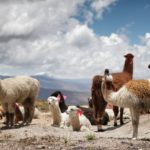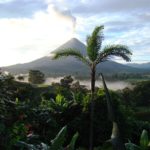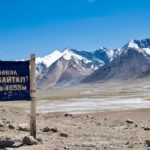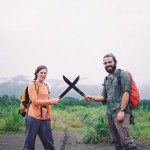Volunteering Abroad: Finding Universal Truths in Ho, Ghana
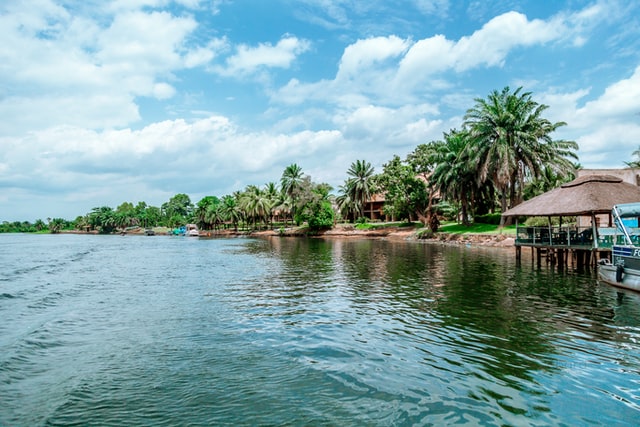
The plane landed. My fellow passenger reminded me that I had slept the entire leg from London to Accra. I would be volunteering abroad for two weeks but I didn’t know what to expect. I exited the airplane and quickly lined up in the short immigration line. I stepped up to the counter.
Coming from the United States, I had never had issues of any kind at immigration. So when I heard the immigration officer say, “Your visa is expired,” I almost had a heart attack. I was alone in the airport with no way to contact my volunteer organization other than through a phone number and e-mail address, which I didn’t have access to in line. I had kept the receipt of the visa just in case, but it didn’t help. Both the receipt and the visa were dated “month/day/year” and not “day/month/year” as is the custom in Ghana.
I silently prayed for a miracle in a land where I didn’t know anyone or the customs or what my options were. After some convincing and pleading, the immigration officer smiled and let me through. Then, two guards dressed in military gear stopped me. The taller, more intimidating since he had a finger cut off and noticeable scars, asked to see my passport. He looked at the date and told me I couldn’t pass, but then the other one who actually smiled at me said it was fine and waved me through. I was sweating through my shirts and not from the weather…
I silently prayed for a miracle in a land where I didn’t know anyone or the customs or what my options were.
I met my volunteer coordinator and headed to the bus station for a three hour bus ride to the city of Ho in the Volta Region. The first day I walked to the orphanage I would later teach at. A kid was playing in the yard and yelled “Ayivu,” while waving. My volunteer coordinator, a native Ghanaian, translated the greeting to “white person” and told me to respond with the equivalent of “black person.” As someone who comes from a multiracial background, mostly Asian, I typically blend in with the locals. This was an experience I had yet to come across.
I tried to explain the fact, that I’m not “white” or what my concept of “white” is. However, that didn’t matter since the categories were black or white, so white it was. Finally, I responded with a smile and the commonly accepted greeting, but inside I was still conflicted over the greeting.
Volunteering Abroad: Finding Universal Truths in Ho, Ghana
On my first day of school, I was stressed and sweating through my clothes yet again as I had to teach children, ages 5 to 13, math and English. As someone with a background in finance and economics, I was scared out of my mind that I wouldn’t be able to keep the children’s attention all day. While I didn’t have many expectations, I was surprised by the children.
They spoke English well enough to respond within the context of a classroom, were eager to learn, loved singing songs, and occasionally goofed around when I had my back to them. Even though I had never taught before, there was something comforting about being among children in an extremely foreign place. Ho is very rural and a significant departure from life in Chicago. (A few days later, I was told to stay inside as there was a crocodile outside the out house.)

After the school day ended, all of the children played soccer and I asked if I could join in since the alternative would be sitting for a few hours. I didn’t want to fall asleep from the heat and the fact I was wearing long sleeves and pants, so I wouldn’t get malaria, didn’t help. I found out later that there was little chance of catching malaria in Ho since there were few mosquitoes.
She had thought Americans and those with stable income were more immune to martial issues.
One day it was too hot to play soccer, so the elders of the school decided to have us race each other a few times. Obviously, I wanted in. I raced with the oldest age group and won. The oldest boy looked at me with disbelief. I asked why he was so shocked. He didn’t want to be impolite but had underestimated me as an older female. The fact that a female could run like him was eye-opening.
I returned back “home.” My living situation was a simple house with a live-in female caretaker. We ate together and she had asked many questions about my life. At the time, my parents were going through a separation, which I shared with her. Her response was utter surprise. She mentioned that she had thought Americans and those with stable income were more immune to martial issues. Coming from the US with a high divorce rate, I was shocked that people would think that, so it was a learning experience for us both.
I could only describe my two-week volunteer trip as one full of learning experiences yet one that only scraped the surface of Ghana’s rich culture. I saw people make fufu, the indigenous and starch rich dish, and watched local artisans weave. I broke down a few barriers yet still felt that I had so much to learn. Rather than see the sights in Accra, I was able to delve deeper by staying in the same place and finding universal truth in a foreign land.
Volunteering Abroad: Finding Universal Truths in Ho, Ghana photos by Unsplash and Jaqueline B.

